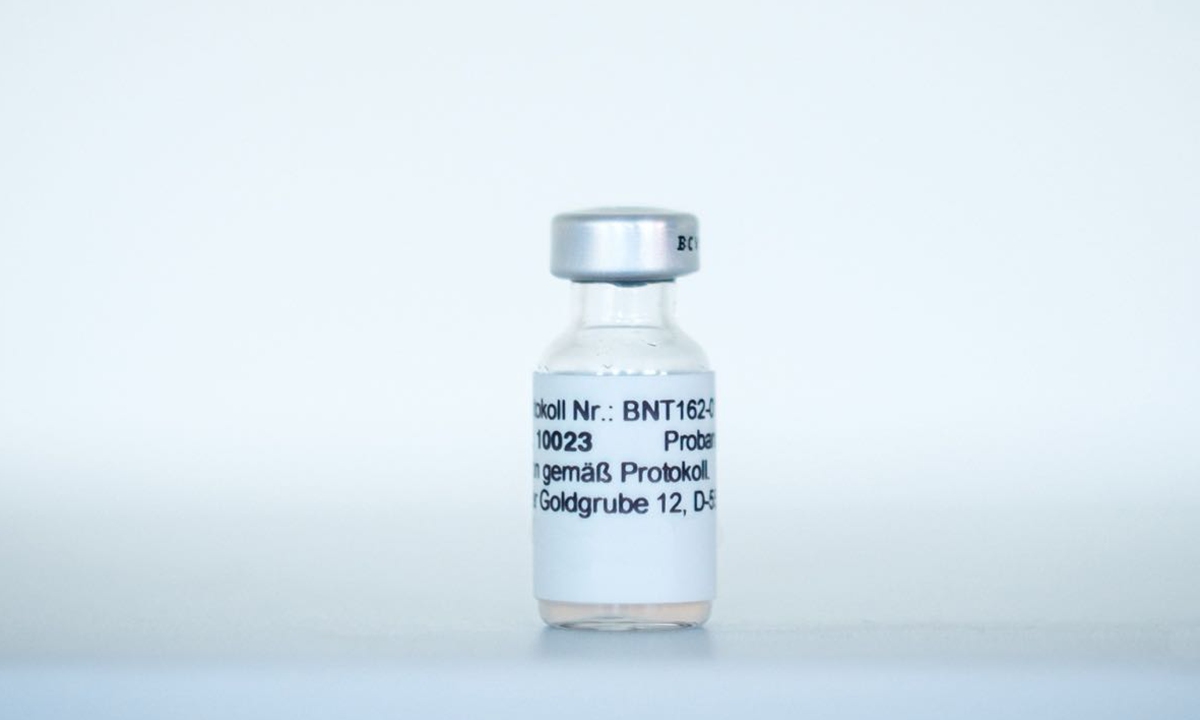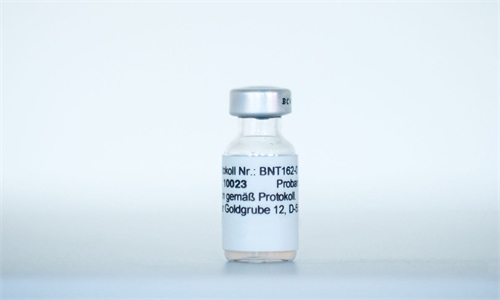Smears over mainland’s vaccine denial to Taiwan collapse with Fosun deal
Firm refutes DPP hype of win on direct delivery from Europe

The COVID19 vaccine BNT162b2 co-developed by Fosun Pharma and BioNTech Photo: Courtesy of BioNTech
The signing of a vaccine purchase deal between companies based on the island of Taiwan with Chinese mainland-based Fosun Pharm proves that smears claiming the mainland is preventing the island from purchasing vaccines were ill-founded, an official of the State Council's Taiwan Affairs Office said on Monday, while calling the deal "very good news."
The deal was made between Fosun and Taiwan-based Foxconn and Taiwan Semiconductor Manufacturing Co (TSMC) and a medical firm, with Fosun to sell 10 million COVID-19 mRNA vaccine shots to the island to help combat the local epidemic, the Global Times learned from Fosun Pharma on Sunday.
Commenting on the deal, Ma Xiaoguang, a spokesperson of the State Council's Taiwan Affairs Office, told media on Monday that the signing of the deal is "very good news" that refutes previous smears circulating on the island that the mainland government was blocking the island's access to vaccines, Taiwan.cn, a news portal under the State Council, the cabinet, reported.
"When people on the island unite and fight against the epidemic, some individuals and forces conduct abnormal operations, which proved to be unpopular. I want to ask these individuals and forces, do not they want to help Taiwan people get vaccines as soon as possible?" Ma said.
"The mainland did not meddle or interfere in the vaccine procurement process, and we thank it for allowing the procurement to be conducted through commercial negotiations," Foxconn founder Terry Gou wrote on his Facebook page on Monday.
Contrary to the mainland authority's applause for the move as help to Taiwan residents who are suffering from a severe vaccine shortage, anti-mainland media and forces on the island hyped the move as a "success" of the island over the mainland authority, highlighting that the vaccines being sold to Taiwan would be delivered directly from BioNTech's factories in Europe.
"Thanks to the Taiwan authority and TSMC that we could get Germany-produced original shots that would be directly delivered to Taiwan," some commented under Gou's post.
However, the Global Times learned from Fosun that as the BioNTech vaccine has not been approved on the mainland, production of the dose has not started on the mainland.
In other words, all the BioNTech shots provided through Fosun's deals would be produced in Germany rather than the mainland.
The highlighted term of "original production and direct delivery to Taiwan" is just a publicity stunt of the Taiwan authority designed to desperately grab credit in striking the deal.
Wang Jianmin, a senior cross-Straits expert at Minnan Normal University, told the Global Times on Monday that it is not surprising that the Democratic Progress Party (DPP) authority would make such efforts to try to erase any element related to the mainland in such deal.
Ma on Monday reiterated that the mainland government had long ago clarified that it was willing to help the Taiwan island fight the epidemic, including providing it with mainland-developed vaccines approved by the World Health Organization.
According to a report by Beijing Daily on Monday, about 99,000 Taiwan residents had taken nearly 174,000 doses of COVID-19 vaccines in the mainland as of June 30.
Due to delays on vaccine purchases and denial of the mainland's kind offer of support, Taiwan saw the local epidemic get out of control starting in May.
The island has so far used vaccines mainly from British-Swedish firm AstraZeneca and US-based Moderna. As of Sunday, only 0.3 percent of residents — 60,720 people — were fully vaccinated with two doses.
Taiwan officials said on Monday that the island had to purchase at least another 15 million AstraZeneca shots in the following two years to ensure stable supply.


